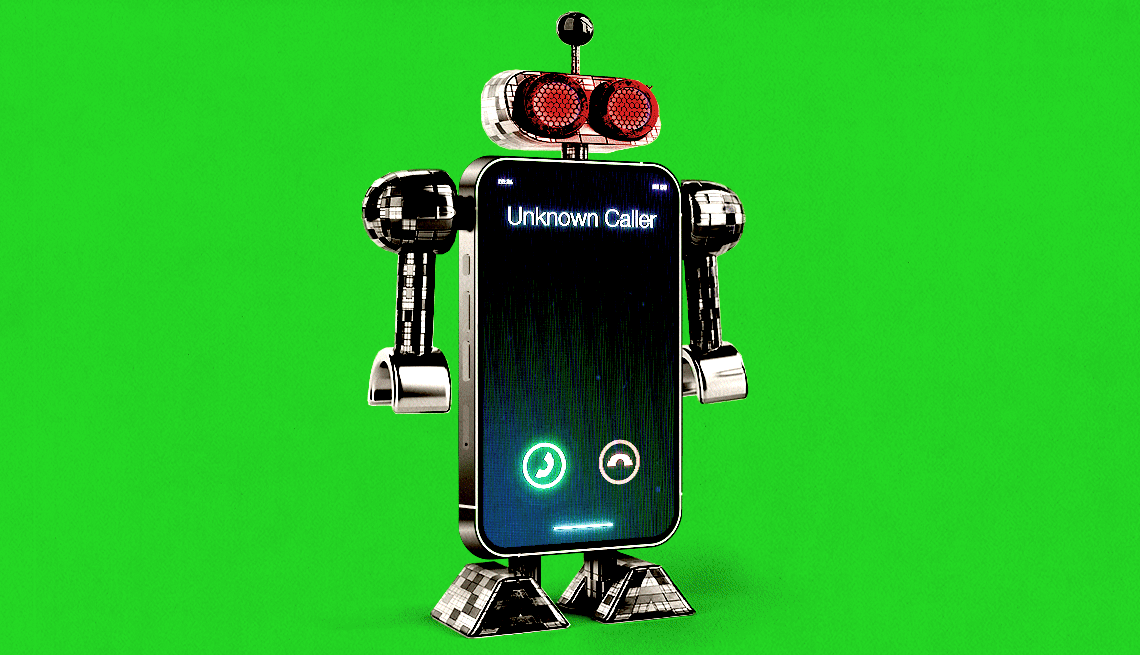AARP Hearing Center


In this story
Size of problem • What are robocalls • Common scams • Efforts to combat • AI and robocalls • Protecting yourself • Reporting scams • More resources
Whether we’re sitting down to dinner or running an errand, our phones are with us — often bearing calls from criminals. Those crooks are behind an endless stream of illegal robocalls dangling goodies such as free cruises or lottery jackpots, demanding payment for nonexistent debts or perpetrating some other scam to steal your money or get your sensitive personal data.
In 2024, nearly 53 billion robocalls were made to U.S. consumers, about 200 calls per adult, according to YouMail, which provides call blocking and management services. Within that data, there are some positive trends, according to the company: Scam calls have dropped year-over-year by 22 percent, with 6.3 billion recorded in 2024.
“Enforcement took out some of the big volume callers,” says Alex Quilici, CEO of YouMail. “Some of it is due to scammers getting highly targeted.” Even so, he adds, over the past 10 years, “we’ve gone from somewhere where you could trust the caller ID and trust the caller to you can’t trust anything.”
What are robocalls?
Generally, robocalls are prerecorded voices, and they may be made through automatic dialing technology. They tend to use VoIP (Voice Over Internet Protocol), which helped them become so pervasive. “Internet-based calling is fantastic in some ways; it’s enabled us to call our friends and family internationally for cheap and easy. But it’s also made it cheap and easy for the bad guys to call us,” says Josh Bercu, executive director of USTelecom’s Industry Traceback Group, which works with providers to combat spam calls.
Not all robocalls are scams. Your doctor may use robocalling to remind you of an appointment, or an airline may share news about a flight change. The Federal Communications Commission (FCC) allows such robocalls, as long as they’re for informational or noncommercial purposes. Pollsters, political campaigns and nonprofit groups (including AARP) can also call you.
If you gave permission for a company to contact you, it can legally make a robocall. (You may not even realize you granted permission because the agreement was buried in fine print.)
Scammers can use caller ID spoofing to make it appear that they’re calling from a legitimate or local number. Although they used to take a scattershot approach to robocalls, criminals shifted to more targeted attacks on victims, using information from data breaches and other sources.
“Unfortunately, all this stuff is on data broker websites now, and it’s not hard to pull it,” Bercu says.
Common robocall scams
Criminals use robocalls to execute a wide range of scams. These are a few of the most common.
Government impostors. Criminals pretend to be from Social Security to steal your personal information; fake Internal Revenue Service agents may threaten you with arrest for unpaid taxes; “officials” offer government grants; or you could get a call saying you missed jury duty and must pay a fine.
Phony utility problem. Scammers threaten to shut off your electricity within 10 minutes unless you pay a fine immediately.
Package delivery issue. A message may say that packages have gone astray or that expensive charges were made on your account.
Romance scams. Callers try to engage in conversation and build a relationship leading to requests for money or investments in cryptocurrency.
Virus scams. Scammers pretend to be from a tech support company warning that you’re not protected.


































































More from AARP
Many Americans Worry About Becoming Scam Victims, New Report Finds
With fraud at a crisis level, AARP report explores feelings about the threat and understanding of criminals’ tacticsWhat to Know About the Latest Amazon-Impostor Scams
Be aware of the latest ways criminals use the company’s name to steal from consumersWhat to Do If You've Just Been Scammed
How one woman worked quickly — with help — to avoid being charged through PayPal